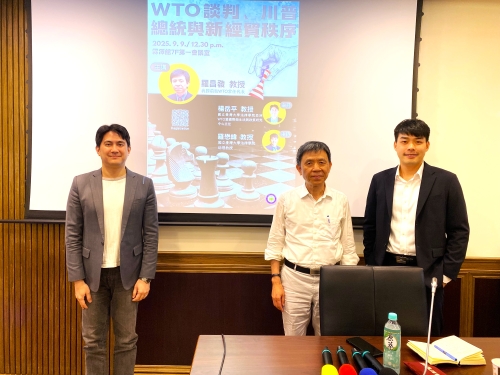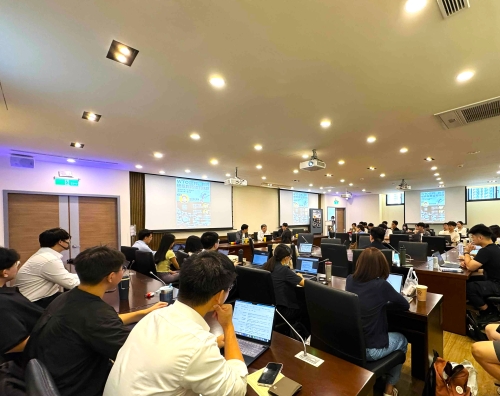
On September 9, 2025, the Asian Center for WTO and International Health Law and Policy (ACWH), College of Law, National Taiwan University (NTU), hosted a timely seminar titled “WTO Negotiations, President Trump, and the New Global Trade Order.” The keynote lecture was delivered by Dr. Chang-Fa Lo, Taiwan’s former Permanent Representative to the WTO, an experienced negotiator, and a distinguished scholar of international economic law. Dr. Lo shared his insights on the WTO negotiations and the broader challenges that the multilateral trading system is currently facing.
The seminar began with welcoming remarks from Professors Yueh-Ping (Alex) Yang and Mao-wei Lo, who highlighted Dr. Lo’s extensive experience in international economic law from both academic and practical aspects. They warmly welcomed Dr. Lo’s back to NTU, where he had previously served as Dean of the NTU Law and as the founder and director of ACWH.
In his keynote address, Dr. Lo stressed that the success of trade negotiations rests heavily on precise language, effective communication, and professional credibility. He reflected on his experiences engaging with colleagues from various WTO members, explaining how constructive dialogue, paired with expertise, not only facilitated negotiations but also built trust, respect, and long-lasting professional relationships. Dr. Lo also contrasted different negotiation settings, noting that while multilateral meetings often ended in deadlock due to entrenched positions, smaller bilateral or plurilateral consultations under the WTO framework sometimes achieved meaningful breakthroughs and drove negotiations forward.
Turning to systemic challenges, Dr. Lo analyzed how the Trump administration had crippled the WTO’s Appellate Body by blocking new appointments, leaving the dispute settlement mechanism—once called the “Crown Jewel” of the WTO—in paralysis. While the Biden administration raised hopes for reform, these efforts eventually stalled, and Dr. Lo predicted that President Trump’s return to office would close the door on near-term solutions. He further warned that the Trump Administration’s broad use of “national security” justifications to circumvent fundamental WTO principles, such as the Most-Favoured Nation Treatment, would continue to weaken the system. Despite these challenges, Dr. Lo underscored the WTO’s enduring importance: nearly 75 percent of global trade still operates under its rules. For Taiwan in particular, the WTO remains crucial as one of the few international organizations where it enjoys full membership, providing significant benefits to its business community. Dr. Lo also advocated for reforming the WTO’s decision-making process to ensure its continued relevance and responsiveness to emerging trade issues.

During the discussion session, participants raised concerns about U.S. resistance to multilateralism. Dr. Lo observed that unilateralism and protectionism favored by the Trump Administration were unlikely to fade quickly. Therefore, Dr. Lo highlighted the notion that Taiwan should remain proactive and seize opportunities for cooperation—even within constrained circumstances. He concluded with a forward-looking message to students: to safeguard Taiwan’s voice and adapt to the “new normal” in global trade governance, they must cultivate knowledge, language proficiency, and credibility.
ACWH extends its sincere appreciation to Dr. Chang-Fa Lo for his enlightening and inspiring lecture.